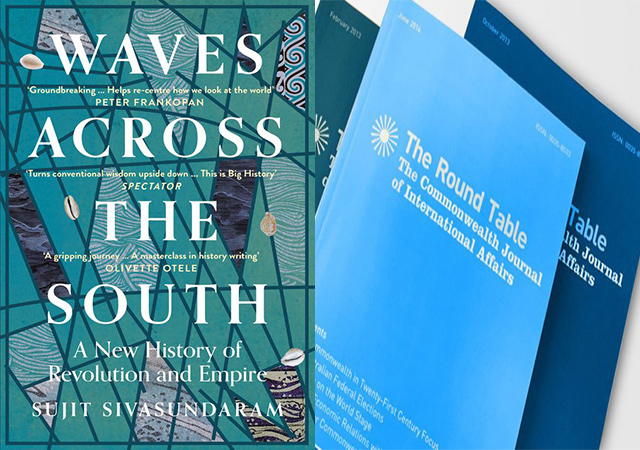
[This is an excerpt from an article in The Round Table: The Commonwealth Journal of International Affairs.]
Waves Across the South provides a groundbreaking reassessment of the expansion of empires in the waters of the global south. It is written not from a Eurocentric perspective. Instead, it shows how indigenous peoples asserted their identity in the face of imperial distension. Written by Cambridge historian Sujit Sivasundaram, it is a stunning methodological invitation to let indigenous peoples speak across the waters even in the face of modernity.
Eight central chapters focus on different time periods and chart interactions across waters. ‘Travels in the Oceanic South’ follows sailing ships Patrick (1825–6) and Carey as they traverse the Southern oceans. While the captains are British, the research describes the diverse ethnicity of the crew and how this shapes interactions between Tahiti and Calcutta. It then examines the writings of Persian poet Abu Talib (1799) as he travels from Calcutta to London, navigating towards imperial Britain.
‘In the South Pacific’ contrasts French (1793) and British voyages (1806) and analyses how leaders in Tonga drew on these interactions to assert their political ambitions. The establishment in the 18th century of these Pacific monarchies is brought into comparative conversation with the rise of the Māori king movement, demonstrating the creative agency of indigenous peoples. Again, there is examination of interactions towards Empire, in letters written by Tongan women to British sailors (1832) and in travel by Māori leaders to London (1820).
‘In the Southwest Indian Ocean’ compares the Dutch and English presence in South Africa. The archival research demonstrates how indigenous leaders influenced trekboer aspirations in 1788 and how information shared by Irish travellers sparked slave revolts in 1808. Cape Town, a centre of Dutch colonisation in the South Indian Ocean, is considered in relation to Mauritius, a headquarters of French expansion.
‘In the Persian Gulf’ describes efforts to save the mail while under attack in the Indian Ocean. History underlines the importance of the flow of information in the rise of empires, including the emergence of Wahhabism as a purifying movement within Islam. Interactions between Arabia and India across the Indian Ocean are shown to be as complex as those between the empires of Britain and the Ottoman dynasty.
‘In the Tasman Sea’ views Australia from land, rather than sea. We meet Cora, an Aboriginal woman from the Eora people of the coastal Sydney region. Through attention to material cultures, such as her necklace and drinking cup, her voice in history is heard. What becomes clear is the central role of indigenous women in proactive and entrepreneurial interactions across cultures.
‘At India’s Maritime Frontier’ describes British maritime military expansion into Burma, Sri Lanka, Java and China. It begins with clashes up the Irrawaddy River between British steamships and Burmese fire rafts and analyses the missionary impact of Buddhist monks travelling between Sri Lanka and Myanmar. British military technology is aligned with commercial ambitions to overrun indigenous capabilities.
‘In the Bay of Bengal’ probes the ways that knowledge and science work as instruments of colonial expansion. The data gathered from astronomical clocks and pendulums relies on indigenous labour and ingenuity. When astronomer John Warren falls ill reporting on the 1807 comet, a brahmin named Srinivasacharya works to ensure the comet’s movements are captured. While indigenous people are active participants in knowledge-making, the knowledge gained is part of epistemology that turns the earth into an object and enables colonial expansion.
‘Across the Indian Ocean’ examines the interplay between the port cities of the expanding British Empire. While England might sign the Slavery Abolition Act in 1833, Waves Across the South traces how abolition was resisted by colonies and bears witness to the insidious ways in which economics drove the Empire. What happens in Bourbon and Cape Town, South Africa, is as important to those in Port Louis, Mauritius, as laws issued from London.
Steve Taylor is the Director of AngelWings, Dunedin and a Senior Lecturer at Flinders University, Adelaide, Australia.
Waves across the South: a new history of revolution and empire by Sujit Sivasundaram, London, William Collins, 2020.



